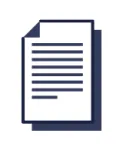| Titre : | Natural Haemophilus influenzae type b capsular polysaccharide antibodies in 412 infants and children from West Africa (Burkina-Faso) and France : A cross-sectional serosurvey. (1999) |
| Auteurs : | F. BALLEREAU ; V. APAIRE-MARCHAIS ; M. SPEICH ; Département de Santé Publique et de Pharmacie Clinique. Faculté de Pharmacie. Université de Nantes. Nantes. FRA |
| Type de document : | Article |
| Dans : | European journal of epidemiology (vol. 15, n° 6, 1999) |
| Pagination : | 577-582 |
| Langues: | Anglais |
| Mots-clés : | Vaccination ; Bactérie ; Programme élargi vaccination ; Programme santé ; Epidémiologie ; Evaluation ; Etude comparée ; Nourrisson ; Homme ; Enfant ; Burkina Faso ; Afrique ; France ; Europe |
| Résumé : | [BDSP. Notice produite par INIST vR0x2o5D. Diffusion soumise à autorisation]. Prior to possible introduction of large-scale vaccination programmes, an estimation and comparison of naturally acquired immunity against Haemophilus influenzae type b (Hib) was carried out in two populations of age-stratified infants and children (from birth to 14 years old) in Burkina-Faso (West Africa) (n=206) and France (n=206). Hib capsular polysaccharide antibodies were detected by an ELISA method. The difference in the percentages of minimum protective levels for the two populations were not significant (0.15 mug/ml) for newborns (0-1 month) but became significant as early as 2 to 3 months of age (p<0.01) when lower levels were found among infants from Burkina-Faso. Subsequently, the percentages in both countries remained low until 11 months of age and showed no significant differences. For children between 12 and 35 months, the results >=0.15 mug/ml were significantly higher in France (p<0.05). From 36 months, the percentage of minimum seropositivity increased in Burkina-Faso, so that the difference was no longer significant. In each country, the percentage of children with the minimum protective level varied significantly (p <= 0.05) according to age (0-47 months). None of the children from Burkina-Faso or France had antibody levels>1.0 mug/ml before one year of age. Thereafter, only 9.51% of French children in the 12-to 17-month age stratum and 19.2% over 4 years of age had antibody levels>1.0 mug/ml. (...) |
Service Documentation EHESP
Me connecter
PORTAIL DOCUMENTAIRE
École des hautes études en santé publique
Catalogue
Multi-bases
Adresse
Service Documentation EHESPBibliothèque Rennes Avenue du Professeur Léon Bernard – CS 74312 – 35043 Rennes Cedex Bibliothèque MSSH Paris 20 avenue George Sand - 93210 La Plaine Saint-Denis
France
Bibliothèque Rennes : 02 99 02 29 50 Bibliothèque MSSH Paris : 02 99 02 24 50
contact


